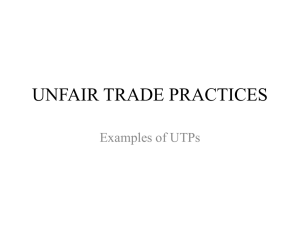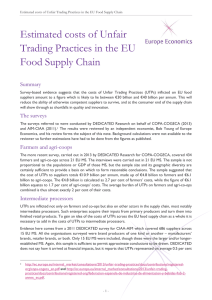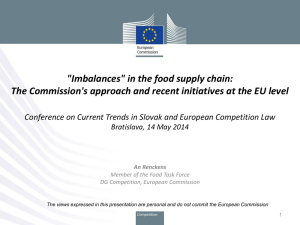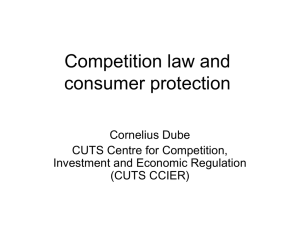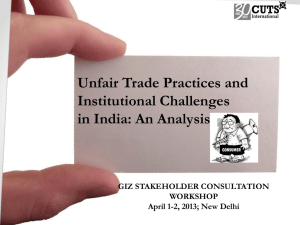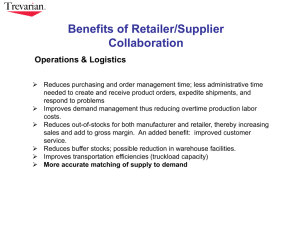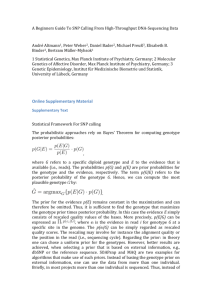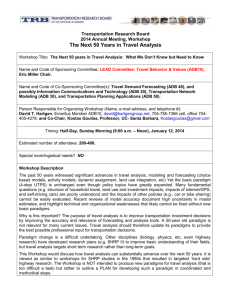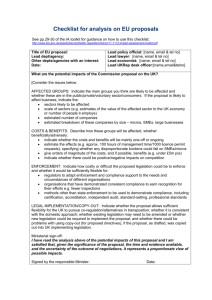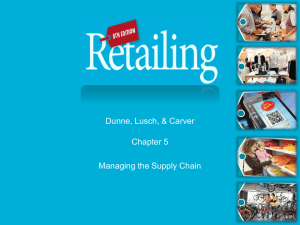DOC - Europa
advertisement
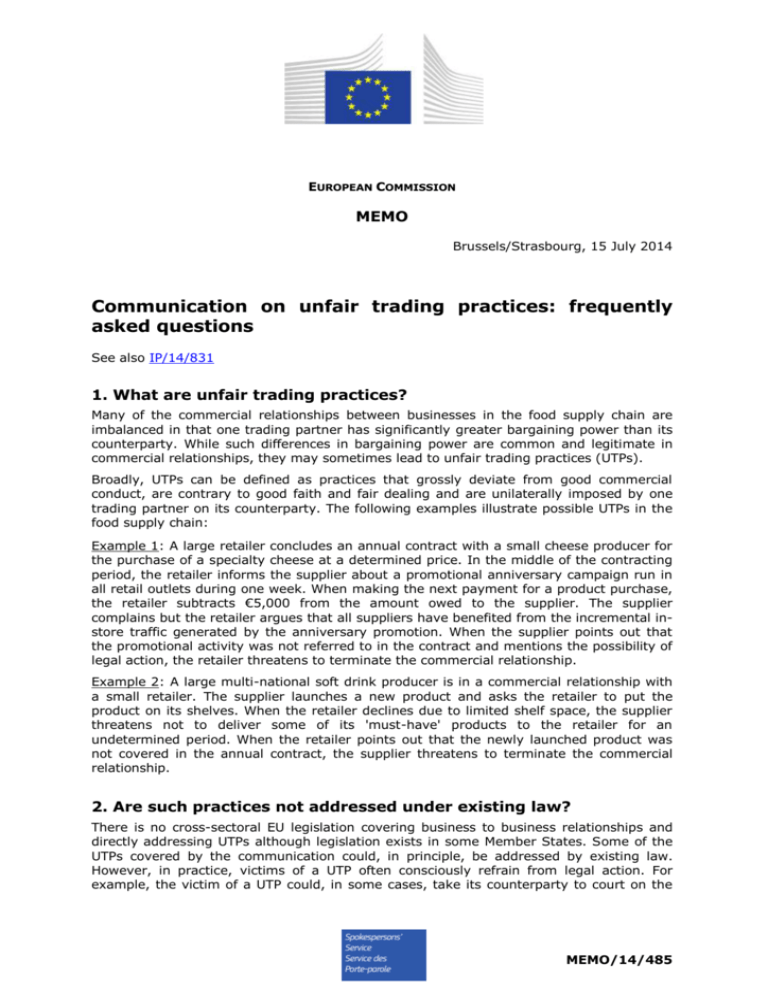
EUROPEAN COMMISSION MEMO Brussels/Strasbourg, 15 July 2014 Communication on unfair trading practices: frequently asked questions See also IP/14/831 1. What are unfair trading practices? Many of the commercial relationships between businesses in the food supply chain are imbalanced in that one trading partner has significantly greater bargaining power than its counterparty. While such differences in bargaining power are common and legitimate in commercial relationships, they may sometimes lead to unfair trading practices (UTPs). Broadly, UTPs can be defined as practices that grossly deviate from good commercial conduct, are contrary to good faith and fair dealing and are unilaterally imposed by one trading partner on its counterparty. The following examples illustrate possible UTPs in the food supply chain: Example 1: A large retailer concludes an annual contract with a small cheese producer for the purchase of a specialty cheese at a determined price. In the middle of the contracting period, the retailer informs the supplier about a promotional anniversary campaign run in all retail outlets during one week. When making the next payment for a product purchase, the retailer subtracts €5,000 from the amount owed to the supplier. The supplier complains but the retailer argues that all suppliers have benefited from the incremental instore traffic generated by the anniversary promotion. When the supplier points out that the promotional activity was not referred to in the contract and mentions the possibility of legal action, the retailer threatens to terminate the commercial relationship. Example 2: A large multi-national soft drink producer is in a commercial relationship with a small retailer. The supplier launches a new product and asks the retailer to put the product on its shelves. When the retailer declines due to limited shelf space, the supplier threatens not to deliver some of its 'must-have' products to the retailer for an undetermined period. When the retailer points out that the newly launched product was not covered in the annual contract, the supplier threatens to terminate the commercial relationship. 2. Are such practices not addressed under existing law? There is no cross-sectoral EU legislation covering business to business relationships and directly addressing UTPs although legislation exists in some Member States. Some of the UTPs covered by the communication could, in principle, be addressed by existing law. However, in practice, victims of a UTP often consciously refrain from legal action. For example, the victim of a UTP could, in some cases, take its counterparty to court on the MEMO/14/485 basis of national contract law. However, the weaker party in a commercial relationship in the food supply chain (in most cases an SME) often fears that taking its counterparty to court for applying a UTP may lead the stronger party to terminate the commercial relationship. Because of this ‘fear factor’, the weaker party often takes no legal action and accepts the UTPs, despite their harmful effects. As a consequence, in Member States where litigation through courts is the only possible way of tackling UTPs, enforcement of any rules addressing the type of UTPs described in the communication is very limited. 3. Can the existing Supply Chain Initiative solve the problem of UTPs? The EU-wide Supply Chain Initiative is a self-regulatory framework developed by organisations and operators in the food supply chain to address UTPs. The Supply Chain Initiative was launched in September 2013 and is based on a set of principles of good practice, which were agreed by participants of the Forum for a Better Functioning Food Supply Chain, a stakeholder body set up by the Commission in 2012. A significant number of businesses across different Member States from the retail and supply side have signed up to the initiative since its launch. The Supply Chain Initiative plays an important role in creating an environment where companies deal with each other in a fair and sustainable way. It requires a substantial effort on the part of all companies signing up to it. In particular, companies joining need to adjust their internal processes and organisation to meet the requirements of the Supply Chain Initiative. It encourages dispute resolution between parties, which can help to avoid lengthy and cumbersome legal action. Therefore, the communication supports the initiative and invites all businesses in the food supply chain to join the voluntary scheme. The ‘fear factor’ explained under the previous question may nonetheless keep the weaker, economically dependent trading party from using voluntary resolution mechanisms. In this case, measures against UTPs can be significantly strengthened by the possibility for the weaker party to have recourse to an independent enforcement authority or body that is able to protect the confidentiality of the complainant. In conclusion, a voluntary initiative such as the Supply Chain Initiative can, if adhered to by parties with a strong bargaining power, help to address and efficiently resolve many cases of alleged UTPs, but does not appear to be sufficient to address all cases of UTPs. 4. What suggestions does the Commission have to solve the problem of UTPs? The communication suggests a 'mixed approach' building on the principles and features of the Supply Chain Initiative and its national platforms and complementing it with independent enforcement at national level. In this way, voluntary initiatives such as the Supply Chain Initiative could be the primary way of resolving conflicts between trading parties while public enforcement or court litigation would be a 'last resort' if the more efficient and quicker alternative of a bilateral solution is not viable. In applying principles as defined in the Supply Chain Initiative, economic actors would obviously have to ensure that they comply with applicable law, including national and/or European competition law, as relevant. From a regulatory point of view, the communication does not assume that a 'one-size-fitsall' solution exists and does not propose legislative action at EU level. It encourages Member States to make sure they have appropriate and effective measures against UTPs in place, taking into account their national circumstances. 2 The communication points to the principles of good practices included in the Supply Chain Initiative as an EU-wide standard for identifying the unfair practices that should be addressed under the Member States' regulatory frameworks. This would facilitate a common understanding between Member States and would create a consistent basis for independent enforcement. To ensure the effectiveness of the independent enforcement mechanisms at national level, the communication identifies some key requirements; in particular it must be possible to accept individual complaints about UTPs on a confidential basis and to conduct investigations. The communication also suggests that national enforcement authorities and bodies cooperate in cases of cross-border UTPs. 5. Why is the Commission adopting a Communication on UTPs now? A number of Member States have recognised the harmful potential of UTPs and launched regulatory initiatives to address the problem or are planning to do so. Other Member States have not taken any action at all. This has led to increasing regulatory divergence across the EU. This communication seeks to encourage a common understanding between Member States about measures to address UTPs. Meanwhile, the Supply Chain Initiative is being put into practice. By expressing strong support for the initiative and inviting shareholders to join it, this communication seeks to strengthen the Supply Chain Initiative. Together, these elements explain why the Commission has chosen the current timing to adopt its communication on UTPs. 6. Why is there a particular focus on SMEs in the context of UTPs? The vast majority of businesses operating in food supply or retail are SMEs or microenterprises and there are only a few, if any, sectors with a comparable number of small businesses. At the same time, market concentration both on the supply and retail side of the market is considerable and, consequently, the food supply chain is characterised by a relatively low number of very large players and a very high number of small players on both the demand and supply side of the market. As a result, many individual commercial relationships in the food supply chain can be described as imbalanced. Such economic imbalances and the resulting differences in bargaining power can lead to UTPs that invariably affect the weaker party in the commercial relationship – in most cases SMEs. So SMEs would be the key beneficiaries of any policy measure helping to reduce or eliminate UTPs. 7. Does the suggested way forward imply legislative action? This is not necessarily the case and depends on each Member State's assessment of whether: its current regulatory framework is appropriate to address the UTPs covered by the communication and the violation of the aforementioned principles of good practice; its relevant enforcement authority or body allows for the acceptance of confidential complaints by individual businesses and offers the possibility to conduct investigations. In any event, the Commission's Communication suggests a way forward for stakeholders and Member States and does not introduce legally binding obligations. The Commission, however, strongly believes that this approach could significantly help to reduce or 3 eliminate UTPs and would, therefore, lead to substantial benefits for companies – especially SMEs – suffering because of UTPs. Against this background, the Commission will assess the progress made on the proposed actions by evaluating the actual impact of the Supply Chain Initiative and the enforcement mechanisms set up by Member States. Following this assessment, the Commission will decide whether further action should be taken at EU level to address the issue of UTPs. 8. Does the approach suggested in the Communication have implications at international level? The focus of the communication is to address the issue of UTPs in the Single Market and reduce the level of regulatory divergence between the 28 Member States. Nevertheless, it should be noted that UTPs applied within the EU could have a direct or indirect effect on producers and companies outside the EU, including in developing countries. In this respect the mechanisms suggested in this communication would also help weaker parties in third countries, including in developing countries, when they are victims of UTPs. 9. What preparatory work was done before coming up with this Communication? The European Commission published a Green Paper on UTPs in January 2013 to gather stakeholder views on the occurrence of UTPs in the food and non-food supply chain and to identify possible ways to address them. The Green Paper consultation elicited 200 responses from a broad range of stakeholder categories. While UTPs can theoretically be present in any sector, stakeholder feedback to the Green Paper suggested that they are particularly problematic in the food supply chain. A study on the different regulatory frameworks in the 28 Member States has also been commissioned. The results of the study confirmed a high degree of regulatory divergence and indicated an increasing trend towards regulatory frameworks combining codes of conduct or voluntary schemes with independent enforcement. For more information: http://ec.europa.eu/internal_market/retail/index_en.htm 4
